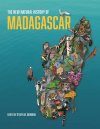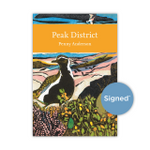By
Leon (NHBS Catalogue Editor)
24 May 2022
Written for Hardback

Before reading this book, I admit that my knowledge of Madagascar was shamefully rudimentary: I knew its location on the world map, the name of its capital city, and that lemurs are part of its endemic fauna. Fortunately for me, anthropologist Alison Richard, backed by her five decades of research experience, has written a natural history book in the broadest sense of the word, encompassing geology, (palaeo)climatology, botany, zoology, conservation, and much else besides. She skillfully dismantles simplistic dichotomies and is particularly passionate about challenging the dominant conservation narrative that Madagascar was a forested paradise until humans arrived.
The Sloth Lemur's Song is revelatory in more than one way and I came away with a much deeper understanding of this remarkable island.
The book follows Madagascar's story chronologically, starting in deep time. Embedded in the supercontinents of Gondwana and Pangaea for hundreds of millions of years, it did not become an island until some 88-80 million years ago (mya). Right off the bat, the plate tectonics story holds all sorts of surprises. At this point, the island would move northwards across 15 degrees of latitude to reach its current position, which took it through the arid belt that latitudinally encircles the globe centred on 30° S. Starting as a lush and green place, this slow-motion transit drastically changed the island's flora and fauna for tens of millions of years. Tropical greenery only returned when the island emerged from the arid belt around 30 mya, starting with the northern tip of the island. Today, only Madagascar's southern tip is still governed by a more arid climate. A second consequence was that the westward-flowing Equatorial Surface Current initially bounced off Africa's coast and was deflected back eastwards, "acting as a sort of watery umbilical cord connecting Madagascar to Africa" (p. 33). Richard loops back to this point in a later chapter when discussing how this enabled flora and fauna to raft across the Mozambique Channel. Once Madagascar moved in the path of this current by 23 mya, local oceanic currents changed, reducing the probability of successful rafting.
The story of Madagascar's fauna is similarly full of surprises. Back in deep time, we find herbivorous crocodilians, the carnivorous frog
Beelzebufo ampinga, and early avian ancestors. The K-Pg extinction seems to have wiped the slate clean, with the abovementioned rafting proposed as one mechanism by which the island was repopulated. Frustratingly, rocks laid down after 66 mya "are heavily weathered and virtually empty of fossils" (p. 66), with the subfossil record only resuming some 150,000 years ago. In this gap, animals arrived and evolved to become the recent fauna. Richard discusses some of the exceptional endemics such as tenrecs, aye-ayes, fossas, and the tiny chameleons that spend most of their short lives as an egg. And then there is the recently extinct megafauna such as hippos, giant lemurs, and flightless elephant birds.
The lack of fossils means scientists have had to use other methods to reconstruct Madagascar's changing flora, fauna, and climate. Richard skillfully explains these, whether it is pollen records, sediment cores, or isotope signals in stalagmites or soil. She is especially keen to stress the caveats and limitations. "Our notions of time and rates of change are captives of the methods available to us for their study" (p. 114) and "island-wide events were rare, and so evidence must be painstakingly collected and analysed region by region" (p. 177). Here speaks the welcome voice of a scientist who chooses rigour and careful interpretation over sweeping statements and neat narratives.
This attitude becomes even more important as the book moves into its second half where Richard discusses how Madagascar changed with the arrival of humans. The dominant narrative, repeated in conservation reports and tourist guides, is that it resulted in extinction and deforestation, with 90% forest loss an oft-repeated figure. She traces this figure to its French colonial source, showing that it was nothing more than a guess, and declares how "the colonists' story about Madagascar is pernicious [...] and doing battle with it has become increasingly important to me over the years" (p. 18).
Throughout the book, but especially in later chapters, she discusses the many strands of evidence that show e.g. how grasslands have long been part of Madagascar's ecosystems. How endemic, fire-resistant grasses evolved millions of years ago, long before humans burned landscapes. How vegetation did not change until millennia after humans arrived. How erosion and the formation of large gullies in the red upland soil have a deep history and seem to be linked to earth tremors, only recently abetted by human activities. How megafauna coexisted with humans for some 6000 years before declining. How cut and chop marks on bones of e.g. elephant birds are surprisingly rare, in contrast to comparable records for extinct flightless birds in New Zealand.
None of this is intended to downplay that the island is facing very serious environmental problems today and that its biodiversity is threatened by human activities. Richard provides many examples of this: the logging of rosewood trees, the overfishing of lakes, the poaching for bushmeat, the exotic pet trade, and climate change impacting all of this. But, she stresses, "just as there was no single moment of human settlement in Madagascar, there was no single moment of environmental disaster. As a demonstration of instant catastrophe triggered by people, the record is a distinct failure" (p. 192). Without diminishing her concerns for the many threats the island does face, this criticism of current conservation narratives is refreshing, thought-provoking, and a welcome acknowledgement of real-world complexities.
Richard adds the occasional personal anecdote of her many years living and working in Madagascar. As opposed to some other books, however, she avoids making this a book about her. These stories are here to illustrate first-hand observations, but never at the expense of the fascinating science.
The Sloth Lemur's Song thus ends up being a book of remarkable balance that mixes a broad picture of Madagascar's natural history with the story of past and present human impacts.
How does this book compare to
The Gardens of Mars, the other recent book about Malagasy history from a trade publisher? Having perused it, this is a well-illustrated book about the recent human history, replete with details on culture and politics. For a broader view of Madagascar, the two thus complement each other nicely, though I would recommend
The Sloth Lemur's Song for those wanting to understand its natural history.






































